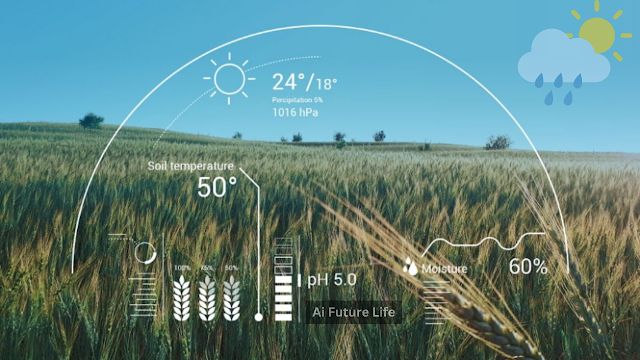Controlling Weather with AI in the Future: Possibilities and Challenges
Introduction: Weather has always been a fascinating and unpredictable aspect of our natural world. From thunderstorms to hurricanes, heatwaves to blizzards, the impact of weather on our daily lives and the environment is undeniable. In recent years, the advancement of artificial intelligence (AI) has sparked discussions about the possibility of harnessing AI to control weather patterns. While the idea may sound like science fiction, it is worth exploring the potential and limitations of AI in weather control. This essay will delve into the topic, discussing the possibilities, challenges, and ethical considerations associated with controlling weather using AI in the future.
Understanding Weather Systems: Before discussing the role of AI in weather control, it is essential to understand the complexity of weather systems. Weather is a result of the intricate interactions between various atmospheric conditions, including temperature, humidity, pressure, and wind patterns. These factors are influenced by global and regional phenomena such as ocean currents, solar radiation, and the rotation of the Earth. Additionally, local geographical features and topography contribute to the formation and behavior of weather systems. It is the intricate nature of these interactions that makes weather control a highly complex and challenging endeavor.
The Role of AI in Weather Forecasting: While controlling weather systems may be beyond our current capabilities, AI can significantly contribute to weather forecasting and prediction. Weather forecasting involves analyzing large volumes of data, including historical weather patterns, satellite imagery, and real-time atmospheric measurements. AI algorithms can efficiently process this data and identify patterns, leading to more accurate weather predictions.
Machine learning techniques, a subset of AI, enable computers to learn from historical data and make predictions based on patterns and trends. By training machine learning models on vast datasets, meteorologists and researchers can enhance their understanding of weather dynamics and improve forecast accuracy. AI algorithms can detect subtle patterns and relationships in data that may not be evident to human observers, allowing for more precise predictions and earlier warnings of severe weather events.
Furthermore, AI can assist in the integration of data from multiple sources, such as weather radars, satellites, and ground-based sensors, to create comprehensive and holistic weather models. These models can simulate and predict the behavior of weather systems, providing valuable insights for meteorologists and emergency management agencies.
Enhancing Severe Weather Response: In addition to forecasting, AI can play a critical role in enhancing our response to severe weather events. With the help of AI-powered systems, emergency management agencies can monitor weather conditions in real-time, analyze data, and make informed decisions to mitigate the impacts of extreme weather events.
For example, AI algorithms can process data from various sensors and weather stations to identify regions at high risk of flooding during a heavy rainfall event. This information can be used to deploy resources and personnel to the affected areas in a timely manner, ensuring efficient response and potentially saving lives. AI can also aid in the coordination of evacuation plans, optimizing routes and logistics based on real-time weather conditions and predicted patterns.
Moreover, AI-powered simulations can help researchers explore the potential impacts of climate change on weather patterns and assess strategies for mitigating these effects. By modeling different scenarios, AI can provide valuable insights into the long-term consequences of certain environmental policies and aid in decision-making processes.
Limitations and Challenges: While AI holds significant promise in weather forecasting and response, there are several limitations and challenges that need to be considered.
Firstly, the sheer complexity of weather systems poses a fundamental challenge. Weather is a chaotic and nonlinear phenomenon, making it difficult to predict and control with absolute precision. Although AI algorithms can improve forecast accuracy, there will always be inherent uncertainties in weather prediction due to the limitations of our understanding and data availability.
Secondly, weather control experiments and interventions raise ethical concerns. Modifying weather patterns on a large scale could have unintended consequences for ecosystems, agriculture, and even global climate patterns. The potential for abuse or misuse of weather control technology also raises questions about power dynamics and equity. Careful consideration must be given to the potential risks and benefits, as well as the ethical and legal frameworks that govern any future weather control endeavors.
Another challenge is the availability and quality of data. Accurate weather forecasting relies on vast amounts of high-quality data from various sources. In many regions of the world, especially in developing countries, the infrastructure and resources required to collect and analyze this data may be limited. Addressing these data gaps and ensuring equitable access to weather information is crucial for leveraging the full potential of AI in weather control.
Conclusion: While the idea of controlling weather with AI may capture our imagination, it is important to separate reality from science fiction. While full control over weather systems remains elusive, AI has the potential to significantly enhance weather forecasting, response to severe weather events, and our understanding of climate dynamics. Through the power of machine learning algorithms and advanced data analytics, we can improve our ability to predict and mitigate the impacts of weather-related disasters.
However, it is essential to approach the topic of weather control with caution. Ethical considerations, environmental impacts, and the limitations of our current scientific knowledge need to be carefully addressed. As AI technology continues to advance, ongoing research and collaboration between scientists, policymakers, and ethicists will be essential to navigate the possibilities and challenges associated with weather control using AI in the future.

.png)

.png)
.png)
